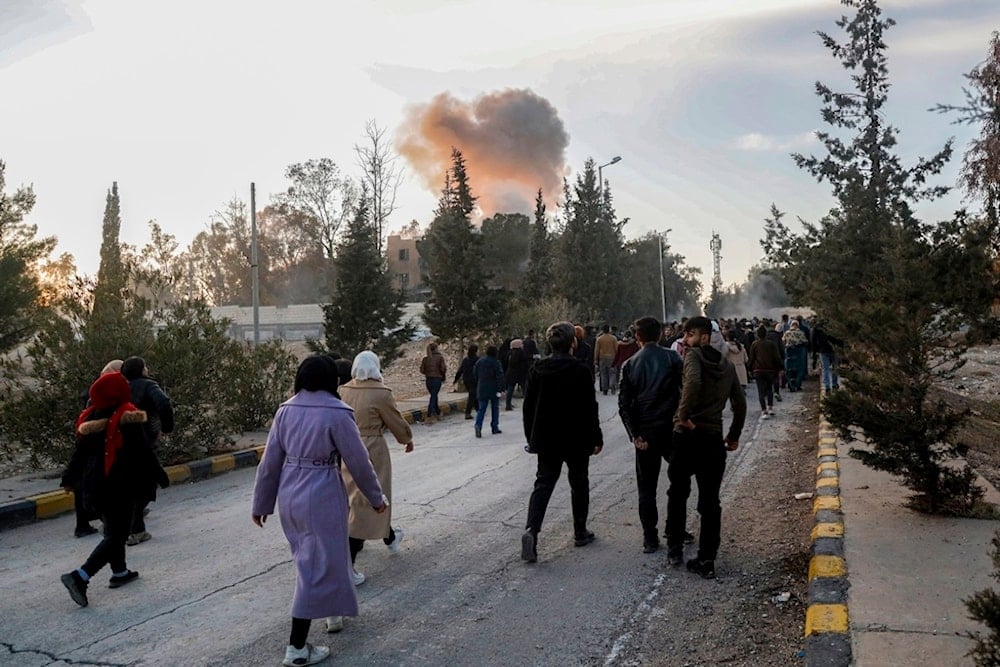SDF ends mobilization in Tishreen Dam as talks with Damascus halt
The Autonomous Administration ends military mobilization near Tishrin Dam after over 100 days of clashes, signaling readiness for negotiations with Damascus.
-

A Turkish drone strike hits near protesters demanding an end to the war around the Tishreen Dam, Syria, Wednesday, January 8, 2025. (AP)
The so-called Autonomous Administration in northern and eastern Syria has announced the end of a state of popular and military mobilization around the Tishreen Dam in the northeastern Aleppo countryside, after over 100 days of what it described as a "popular resistance" against attacks targeting the facility.
In an official statement, the administration claimed that the dam had been under repeated attack by factions supported by Turkey since the beginning of the year, threatening a vital infrastructure that provides water and electricity to millions of people in the region.
The statement noted that the mobilization witnessed broad civilian participation alongside the US-backed Syrian Democratic Forces (SDF) and the Women's Protection Units, which contributed to repelling any attempted advances toward the dam. While the mobilization has ended, the administration emphasized continued vigilance against future threats.
Ceasefire implemented?
It remains unclear whether the announcement reflects the implementation of a ceasefire agreement with the Syrian government or is simply a unilateral gesture toward both Damascus and Ankara by the SDF, expressing readiness for peaceful resolutions.
Significantly, less than 48 hours prior to the ceasefire declaration, a drone strike targeted the Tishreen Dam area, killing a senior SDF commander and wounding others.
This came after pro-Damascus media outlets reported reinforcements being dispatched to frontlines near the dam in a show of escalation toward the SDF.
Negotiations frozen over disputed agreements
Direct talks between the Syrian government's delegation, led by transitional phase head Ahmad al-Shara', and the SDF delegation, headed by Mazloum Abdi, have been suspended for over two weeks amid reports that the March 10 agreement between the two sides has been frozen.
According to Al Mayadeen's sources, the Syrian government demands full responsibility for the security of the Tishreen Dam and the Sheikh Maqsoud and Achrafieh neighborhoods in Aleppo, including placing the Kurdish Asayish security forces under the authority of the Syrian General Security. The SDF, however, opposes this, insisting on a joint administration while preserving the Asayish's role as local security.
The political deadlock has reportedly extended into the education sector. The new Syrian administration's Political Affairs Committee has frozen an agreement between the Syrian Ministry of Education and the Autonomous Administration's education authority, which would have allowed around 10,000 students in al-Hasakah to sit for official national exams.
Statement a message of de-escalation
Field sources told Al Mayadeen that the statement by the Autonomous Administration regarding Tishreen Dam is intended as a message expressing a lack of desire to continue hostilities and a willingness to resume negotiations.
The sources added that it is unlikely the Syrian General Security will enter the dam premises directly, as the agreement appears to assign the site a civilian administrative role.
They confirmed that the ceasefire agreement includes the deployment of General Security forces as a buffer between the SDF and Turkish-backed forces to ensure compliance.
The same sources indicated that relations with the new government are "good," and that dialogue remains the preferred approach, with talks likely to resume soon for the gradual implementation of the March 10 agreement.

 3 Min Read
3 Min Read








